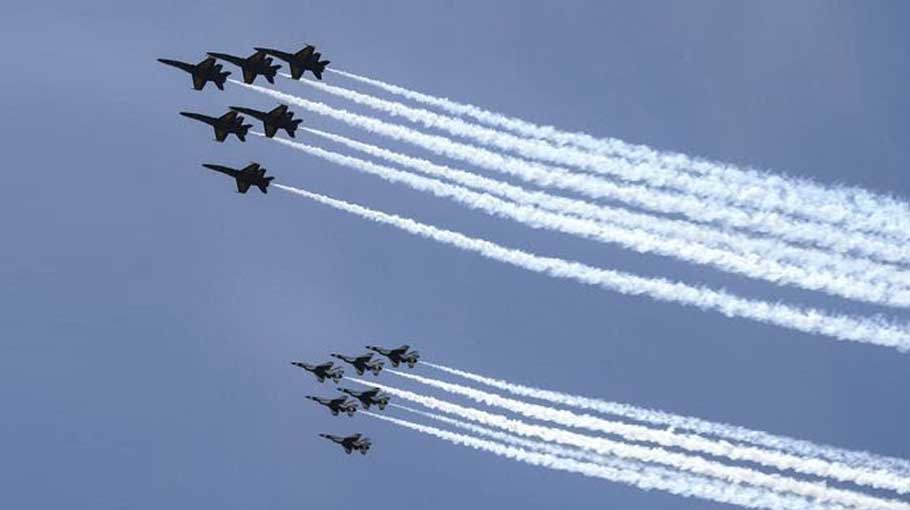How wars contribute to global warming
COP26 needs to bring the world’s attention to climate change-induced military challenges

The discussion and negotiation on military emission are almost missing at the Glasgow UN Climate Change Conference (COP26). Though militaries are major emitters, the 2015 Paris Agreement has left the greenhouse gas (GHG) emission target to the discretion of individual countries.
The reporting of military emissions by nations is voluntary, and thus when they report, it is not often complete or even included. With it, the credible and meaningful commitment of the countries to reduce their military GHG emission.
While global climate change has posed an existential threat for the planet, the nation-states are still primarily preoccupied with protecting and promoting their national security through military means.
Read more: COP26 draft vents alarm
While the world spends $2 trillion a year on armed forces, the rich countries are still at least $20 billion short of their pledge at the Copenhagen Climate Summit (COP) in 2009 of $100 billion annually for the Green Climate Fund to support developing countries in adaptation.
Civil wars and wars add more to global warming. The
COP26 at Glasgow needs to bring the world’s attention
to wars and their contribution to global warming
Though the policy priorities for national security are still focused on military power, the armed forces are engaged in finding ways to cope with the fast-changing climate.
Nato, particularly the Pentagon, has been deliberating and planning for many years to prepare for the climate change-induced new and unconventional military challenges. More than a decade ago, I had prepared reports for the Swedish defence preparedness on the emerging security threats in the Middle East and Southern Africa due to climate change.
Civil wars and wars add more to global warming. The COP26 at Glasgow needs to bring the world’s attention to wars and their contribution to global warming
-The military establishment of the West has assumed that climate change will pose unconventional security challenges to them by creating chaos, societal violence, and mass migration in poor and developing countries. Climate change-induced rising temperatures, recurring droughts, severe floods, sea-level rise, and intense extreme weather events also directly affect millions of people worldwide.
Read more: Erdogan to skip COP26 climate summit
Global warming creates food insecurity, increases competition for natural resources, and makes livelihoods less secure. By reversing economic growth, climate change is being feared to undermine social cohesion and institutional legitimacy, destabilising the governments. The increased number and intensity of natural disasters can create additional demand on the state, and if unmet, can undermine the regime legitimacy. The resulting collapse of states might further increase the need for Western military intervention for peace enforcement and peacekeeping purposes.
Climate change impacts military bases, equipment
However, the military’s worry about climate change is not limited to the possibility of their increased international assignments to enforce peace and security in regions suffering from state collapse. The military is increasingly concerned over the impacts of climate change on their bases, equipment, and assignments.
Hotter temperature makes the conditions for military missions more difficult. Severe storms and floods occurring in high frequency destroy the military bases, cause deaths and injury to armed forces, and demand them to be more often engaged in rescue and relief operations. The rising temperature and rough weather also impact the viability and durability of arms and other military hardware.
There is an increased demand for the military in different parts of the world to build or renovate their buildings and bases to make them climate-proof. Moreover, the armed forces are also worried that climate change might expose servicemen and women to new diseases and other health challenges.
Undoubtedly, the world’s military establishment is concerned about the impacts of climate change and has been actively working to find ways and means to adapt to the new challenges it brings. However, while the military’s focus has been adapting to climate change’s current and future effects, it has primarily shied away from taking measures to mitigate climate change.
The planet is seriously struggling to limit global warming within a 1.5C degrees increase. Many countries and sectors are being named and shamed for their GHG emissions. However, rarely anyone points the finger at the military, a significant culprit for global warming.
Militaries of the world are contributors to climate change. The limited public criticism in some countries like the US and EU is being negated by the assertion of defence departments that they have been gradually transiting to non-fossil fuel technology. This conversion process is slow. There is also a lack of understanding about the magnitude of the carbon footprints of the militaries.
Global arms production and sales are increasing every year. The carbon cost of procurement of military hardware and other supply chains is rarely taken into account. The military training sites causing fire, pollution, and contamination add to carbon costs.
There is no doubt that the world’s militaries are significant contributors to global GHG emissions. The civil wars and wars add more to global warming. The COP26 at Glasgow needs to bring the world’s attention to wars and their contribution to global warming.
If the world is serious about climate change, it must set a clear GHG
emission target for the military and try everything to manage conflicts peacefully.
Ashok Swain is a Professor of Peace and Conflict Research, at Uppsala University, Sweden.
Source: Gulf News.




